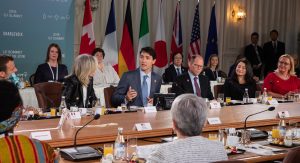How to Get Into Politics: A Roadmap to Engagement
How to Get Into Politics
Politics is a diverse field covering roles from reading news to becoming a politician. To become a politician, you need experience, education, and qualities like leadership, communication, knowledge, and vision. Understanding political concepts, policies, and institutions is essential for success.
Defining Politics
Politics is a multifaceted term, covering governance, resource allocation, decision-making, and more. Essentially, it’s the mechanism through which individuals establish and amend the fundamental laws governing their lives. As politics often deals with conflicting views and interests, it revolves around conflict resolution. Also, read about What Is Fracking in Politics
Why Choose Politics:
Choosing a career in politics offers the unique opportunity to be a catalyst for significant change. It allows individuals to advocate for policies aligned with their values and represent the interests of their constituents. Not only does politics provide a platform to address pressing issues and shape the future, but it can also offer financial stability. Many elected officials receive competitive compensation packages, including salaries, benefits, and allowances, making a career in politics personally fulfilling and economically viable for those dedicated to public service.
Entering Politics:
There are various paths to enter politics:
Educate Yourself:
Education in political science offers theoretical insights and opportunities to connect with like-minded individuals. It equips you with the knowledge needed to navigate the complex world of politics effectively, ensuring you are well-prepared for a career in this field. It’s a valuable investment in your political journey.
Volunteer:
Volunteering for political campaigns is a great way to gain hands-on experience and start with tasks like voter registration. It provides a practical understanding of the political process and lays the foundation for a more active role in politics.
Campaigning:
Joining political campaigns is a pathway to make a real impact and develop essential skills for your political career. It offers firsthand experience in mobilizing supporters, understanding campaign strategies, and effectively communicating with constituents.
Party Involvement:
Becoming part of a political party and working your way up the ranks is a common path.
Stay Informed: Keeping abreast of political news and events is essential for informed discussions.

Civil Service:
For those who prefer non-partisan roles, considering a career as a civil servant is a valuable option. Civil servants play a critical role in the functioning of government, providing essential public services and offering impartial advice to policymakers, focusing on serving the public good rather than any particular party’s agenda.
Local Government:
A career in local government offers opportunities to work in various areas, including urban planning, transportation, and community services. Local government officers play a vital role in enhancing community life, addressing issues such as infrastructure development, urban regeneration, and public service delivery, and ensuring that local areas thrive and prosper. Discover more about What Are Politics
Skills for Politicians
Effective Leadership:
Leadership skills are the cornerstone of a successful political career. Politicians need to inspire and guide their constituents and colleagues. Strong leadership entails not just leading but also the ability to listen to others, build consensus, and make difficult decisions. Politicians often face complex issues, and their leadership is instrumental in finding solutions.
Clear Communication:
Communication is the bedrock of politics. Politicians need to articulate their views, policies, and ideas clearly and persuasively. Effective communication fosters understanding and trust among constituents and fellow politicians. Being able to convey complex issues in a straightforward manner is key to winning public support.
Critical and Creative Thinking:
Politicians must analyze problems critically, assess the potential impact of policies, and formulate innovative solutions. Critical thinking helps in evaluating the consequences of decisions and considering the perspectives of diverse groups. Creative thinking, on the other hand, enables politicians to devise novel approaches to address issues, leading to better outcomes.
Teamwork:
Collaboration is vital in politics. Politicians often work in teams, whether within a political party, government bodies, or legislative bodies. The ability to work cohesively with colleagues, even those with differing viewpoints, can lead to the successful development and implementation of policies. Effective teamwork promotes the accomplishment of shared goals. Authenticity:
Authenticity is a prized trait in politics. Authentic politicians are seen as genuine, transparent, and true to their values and beliefs. Authenticity fosters trust and credibility among constituents. In an era where people value sincerity, authenticity is a significant asset for politicians.

Emotional Intelligence:
Politicians need to be attuned to the emotions and concerns of their constituents. Emotional intelligence helps in empathizing with people’s needs, addressing their fears and hopes, and connecting with them on a personal level. Politicians with high emotional intelligence can build stronger relationships and understand the complexities of the issues they tackle.
Negotiation Skills:
Politics often involves negotiation and compromise. Politicians must have the ability to engage in productive negotiations to pass legislation, form alliances, and resolve conflicts. Effective negotiation skills contribute to successful governance.
Conclusion:
When embarking on a political career, various paths are available. The choice depends on your aspirations and career goals.
By following these paths, you can make a significant impact on your community, region, or nation, shaping a better future for all.
FAQs
What qualifications do I need to get into politics?
Qualifications vary depending on the position you’re aiming for, but many politicians have undergraduate degrees in fields like political science, law, or public administration.
How do I start a political career with no experience?
Starting as a volunteer for political campaigns, joining local party committees, or running for entry-level positions can be great ways to gain experience with no prior political background.
Is it essential to be affiliated with a political party to enter politics?
No, it’s not necessary to be affiliated with a political party to enter politics. You can run as an independent candidate or work in non-partisan roles like a civil servant.
What skills are essential for a successful political career?
Skills such as leadership, effective communication, critical and creative thinking, teamwork, and authenticity are vital for a successful political career.
How can I stay informed about politics and current events?
Staying up to date with political news is crucial. You can read newspapers, follow reputable news websites, and actively engage in discussions on political matters.
What are the potential career paths within politics?
Politics offers various career paths, including elected positions, policy analysis, public relations, campaigning, and civil service roles in government departments.
